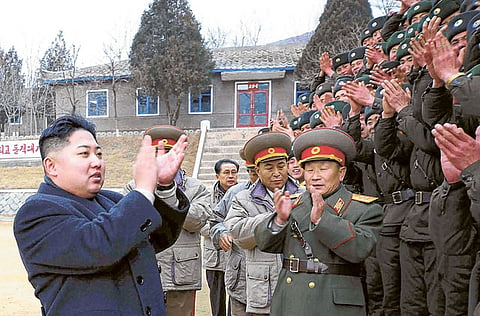Pyongyang's illusion of a strong nation
Rather than deceiving the people with empty promises, Kim Jong-un must undertake the path of reform for the very survival of his people

Upon his assumption of the chairmanship of the National Defence Commission in 1998, Kim Jong-il promulgated "construction of a strong and prosperous nation" as the goal of his era. This was ostensibly meant for North Korea to "join the ranks of strong and prosperous socialist nations that have strong national might, prosper in every respect, and make its people lead an enviable life by April 15, 2012, marking the 100th birthday of Kim Il-sung."
In the 1990s, Kim Jong-il rejected the global movement of reform and opening and instead pursued politics of extreme isolation. This led to the deaths of two to three million North Koreans due to starvation. Despite the severity of his people's plight, Kim Jong-il had a ‘knack' for identifying what was needed to effectively rule North Korea's population.
Thus, he conceived the idea of building a ‘strong and prosperous nation.' The North Korean populace, mired in extreme hardship like a drowning man clutching at a straw, anchored their hope in creation of a ‘strong and prosperous nation,' and Kim Jong-il managed to maintain his regime for another 14 years.
On Friday, its long-range rocket test ended in failure, disintegrating in mid-air soon after blasting off. And far from materialising the vision of a strong and prosperous nation, however, the country is in an even worse condition than the poorest African nations.
North Koreans are suffering from famine and dying of starvation not only in industrial zones including Cheongjin and Hamheung, but also in South Hwanghae Province, an important grain belt. Most North Koreans have neither sufficient food nor wood for fire.
The lack of medicine has left many people addicted to a North Korean drug dubbed ‘ice' as an expedient to alleviate their pain or forget their despair. Some people have suffered hallucinations in their hunger and have even resorted to cannibalism.
On the streets, young women, often referred to as ‘cigarette-selling girls', are prostituting themselves for rice and medicine. Shockingly, even female doctors are joining these ‘prostitutes.' Where is the promised ‘strong and prosperous nation'?
Despite the serious famine plaguing North Korea, Kim Jong-un, the third generation of his family to come to power following the death of his father, Kim Jong-il, has prepared for the so-called ‘Day of the Sun' i.e. Kim Il-sung's birthday today. An astonishing array of political and military events are planned, including a convention of the Workers' Party delegates, the fifth session of the twelfth Supreme People's Assembly, a political celebration of the 100th Day of the Sun, and a military parade marking the 80th anniversary of the establishment of the North Korean People's Army. The cost of holding a convention of the Workers' Party delegates and a session of the Supreme People's Assembly is considerable.
Reportedly, 800 artistes from 23 countries will participate in today's commemorative art festival. Assuming a cost of $10,000 (Dh36,700) to cover the airfare, hotel accommodation, and cash prize for a single foreign artiste, the total cost to North Korea will be at least $8 million, not to mention the qualifications of participating artistes.
Military-first politics
North Korea needs to spend at least hundreds of millions of dollars to hold a public rally today as well as a state banquet and a torch march in the evening, and to stage a military parade to celebrate the 80th anniversary of its armed forces on April 25.
More importantly, the launch of the long-range missile cost $850 million, enough money to pay for food to feed North Korea's entire population for a year.
The fact that Kim Jong-un is holding the biggest events ever and tried to launch a long-range missile while failing to provide adequate food, clothing, and shelter to the populace implies that the North Korean leadership, including Kim Jong-un, is not concerned about the starvation of his people at all. They are merely casting the dice on maintaining the regime.
Kim Jong-un places top priority on cementing internal cohesion and garnering support from the Workers' Party and the military by capturing the North Korean people through an illusion of a strong and prosperous nation. Towards this end, he apparently intends to continue Kim Jong-il's "military-first" politics, pursue a nuclear programme and develop missiles. However, Kim Jong-un has made one important oversight.
The foundation of politics is to meet the daily needs of the people including food and fuel. The North Korean regime can become unstable at any time if the leadership fails to feed its starving people.
Though belated, Kim Jong-un must shift from ‘military-first' to ‘people-first' and ‘economy-first' politics. Rather than deceiving the people with empty promises and illusions, he must take the path of reform and openness to resolve the matter of the mere survival of his people by providing daily necessities.
Ko Young-hwan is a senior research fellow at the Institute for National Security Strategy in Seoul.



